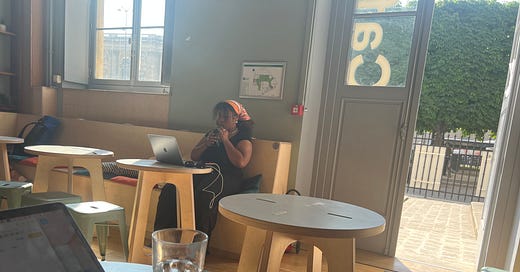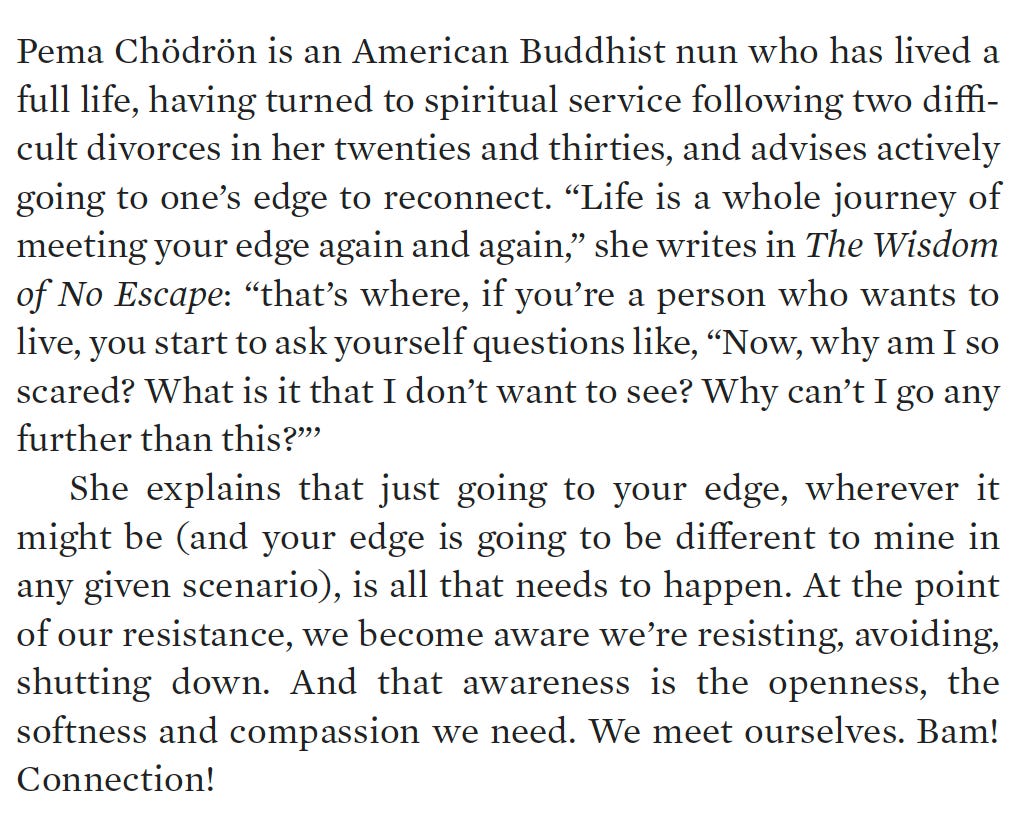I think I’ve quoted this Rilke wisdom here (or there) before (and possibly recently).
“Let everything happen to you: beauty and terror.”
I’m deep in this (everything)1 as I write to you from a cafe adjacent to some sort of art school and across the road from the Louvre where students use the powerpoints and buy the cheap coffee to be among it all, productive, together.
I’m in the beauty and terror. And I have no choice but to let everything happen. I’m in too much pain and overwhelm to fight it. It’s all very big. It’s beyond the furious work of my grubby fingers.
A few drop-downs have conflated around all this and I’ll share here, if you don’t mind, by way of calming myself down, but also because I always figure that if one person is going through it, others are/have/will to. And the best we can do is look across at each other in such moments and say, “Tell me how it is for you!”.
So, I met a very kind, capable man here in Paris who has put Good Work into sorting out his shit and arriving at each day with more to contribute than he takes. And he said he has an abhorrence (within himself) of comfort. When he gets comfortable he moves and shakes things up. It’s extreme enough for his shrink to advise he back off from it a little. We talked about it over a pisco sour that he made for us.
It’s also a theme I have been playing with for about five years, here (and beyond). Like where I chat in and around Anthony Bourdain’s “Travel isn’t always pretty” line. And also when I flesh out Bill Murray’s line, “I try to be available for life to happen to me”.
But my favourite wisdom to this entire effect comes from Pema Chodron, which I make use of in Wild and Precious.
Then I was listening to a podcast on The Gray Area about Simone Weil. I’d not read too much of her work. Correction, none. But the podcast made me finally dig around a little. She was an extraordinary human being. The experts in the podcast above said they’d be too intimidated to meet her IRL. Which struck me as an odd conclusion to arrive at. But anyway.
Albert Camus was in awe of Weil’s authenticity. She lived fully in truth, which saw her die young (from, in essence, starving herself). She wrote (and lived out a life) all about letting everything happen to her. As a practice in truth. And love.
I had to use the Googles to do a preliminary shallow dive into her work. And I dug up this from her book in First and Last Notebooks about the “way to make use of physical pain”.
When suffering no matter what degree of pain, when almost the entire soul is inwardly crying “Make it stop, I can bear no more,” a part of the soul, even though it be an infinitesimally small part, should say: “I consent that this should continue throughout the whole of time, if the divine wisdom so ordains.”
The soul splits in two when we fight and discipline pain, she argues. And this splitting causes a second pain - a spiritual one, “even sharper than the physical pain that causes it”.
It’s much like the “only do anxiety once” axiom I work to in First, We Make the Beast Beautiful. A panic attack only lasts 15 minutes (yeah, surprised me too at first)…but then we panic/get anxious about the original panic/anxiety. Then we get anxious about being anxious about being anxious. Down, down, down, we go.
Weil adds:
A similar use can be made of hunger, fatigue, fear, and of everything that imperatively constrains the sentient part of the soul to cry: I can bear no more! Make it stop! There should be something in us that answers: I consent that it should continue up to the moment of death, or that it should not even finish then, but continue for ever….
To make use in this way of the sufferings that chance inflicts upon us is better than inflicting discipline upon oneself.
Let everything happen.
Let it. Let it.
The resistance is worse and makes it all much worse and is not the truth.
So, what’s your pain? Can you let it happen? And not wish it to stop? Can you see when the discipline and effort is so clearly not the truth? Can you consent to it continuing forever, if need be.
I struggle.
In part because of this quandary: How do you know when you’re not meant to fight it? Because, clearly, some issues you are meant to fix, right. You put your hand on a hotplate, a good fix is to remove your hand.
I’ve struggled for a long time to navigate this fine line. We all do, I think. In many ways we do need to do both - to be courageous enough to correct things when this is the truth and the serenity to let it happen. The Serenity Prayer and all that.
I think there is often a juncture at which the wisdom to know the difference arrives. It’s after you’ve efforted for some time, but nothing budges, and the pain confounds and you find yourself crying out to the heavens, Why? And, Make it stop!s. It’s when you begin to very legitimately worry that you won’t make it, that you can’t go further. You consent and allow because there’s no other option.
But Weil’s and Rilke’s point is to let everything happen sooner. To not wait to hit the cul-de-sac. And also to consent to pain and terror always, as you would beauty.
This is the art of life. It’s also maturity.
For me, in this moment, the pain seems unbearable2. I’ve gripped and efforted for weeks. I’ve disciplined. And everything keeps happening, in spite of my effortings. My tactics are not working. And then, I kid you not, right in this moment as I write this, “Always look on the bright side of life”plays in this cafe I’m sitting in (I’ll post it on IG).
And. I. Mean.
At these painful junctures, there’s always a frontier that needs to be pushed through. I’m witnessing that I gravitate to the opportunities, and even create the circumstances, for going to this particular experience of pain. Which is to say, I travel to the other side of the world to a notoriously loud city when I have what is known as hyperacusis. I think this also gives us a clue, too, as to when to let things happen rather than fight, fix and discipline. Perhaps it’s when we seek out the challenges that push us to our limits. Perhaps this is a sign we want to go to that frontier. That we’re ready to mature to another level.
It’s good to work out what our really painful point is. And to be aware of whether we are disciplining our way around it, or leaning toward it.
As Brene Brown says when she feels fear and discomfort, “It’s a trigger for me to notice that something is happening, something is moving”.
Sarah xx
PS My computer went flat and then I left the cafe and then I realised I’d left my Qantas-issue purse thing with all my bits in it (including Beverley the Banksia pod doll and other important things) in the cafe. I went back 90 minutes later. It was still there. I sat on the steps in the sun and cried.
I’m not going to detail my ongoing panic state around sleep and finding somewhere to live. I don’t want sympathy. Just the broader discussion.
Again, no need for detail.






I get you. Not going to ramble on but I tried something recently which actually helped.
The idea came from Michael Singer - 'The Untethered Soul'
I watched a talk in which he outlined a way of being :
You know that conversation you are constantly having with yourself? The one that's making you sick. Well, there is a part of you which is listening to the conversation - that is where you need to live - that is where you drop your anchor - so go behind the mess and chaos and language and intellect and terror.
I have been experimenting with this and each time I manage to understand what he is getting at I feel a shift; I glimpse some peace and ease and possibility.
All the best to you.
Sarah Wilson, I love your writing and everything you stand for. ✨ From a fellow nomad in Iraq (heading back to Berlin soon, broken-hearted and full of love at the same time), keep going, keep going. ❤️